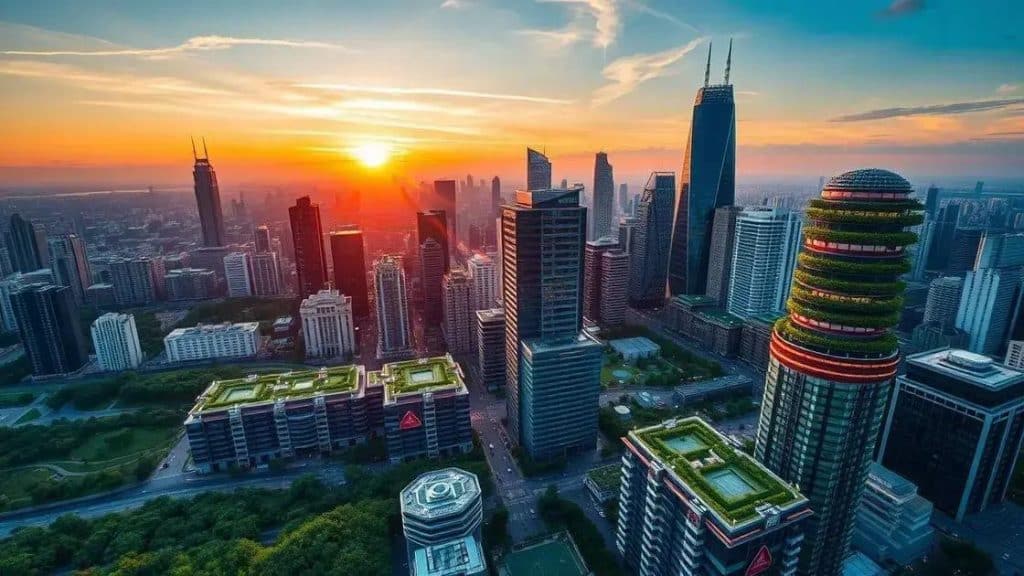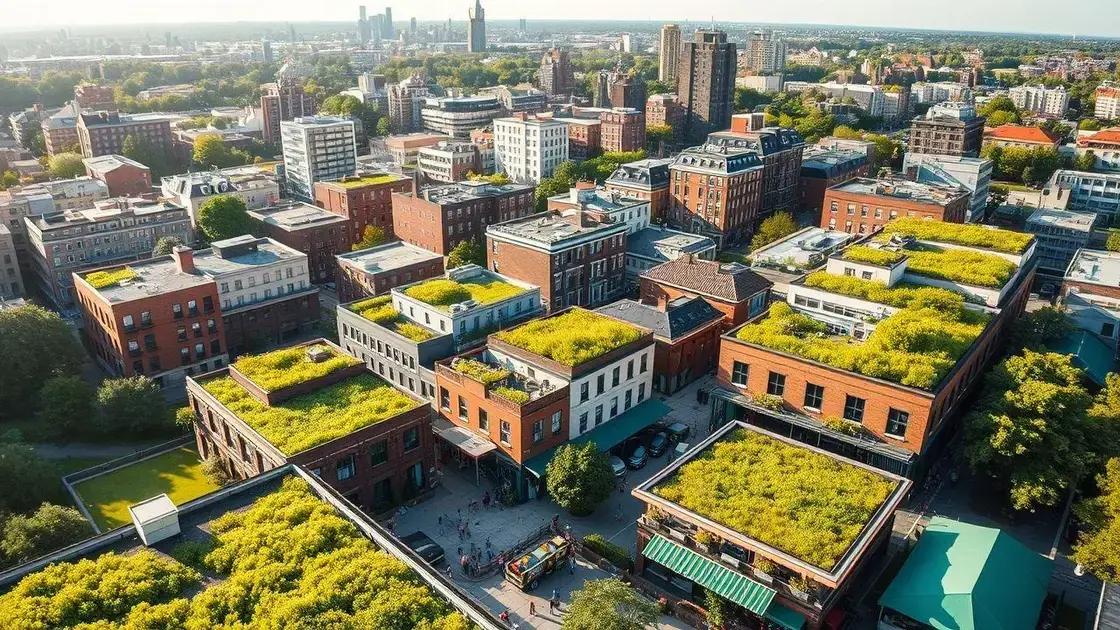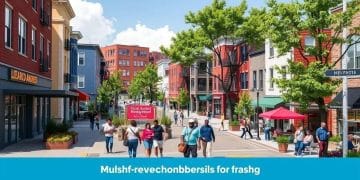Urban development initiatives transforming city landscapes

Anúncios
Urban development initiatives encompass strategic projects aimed at enhancing city infrastructure, promoting sustainability, and engaging community participation to improve overall quality of life.
Urban development initiatives play a crucial role in shaping the future of our cities. Have you ever wondered how they can improve your community or enhance your daily life? Let’s delve into the transformative potential of these initiatives.
Anúncios
Understanding urban development initiatives
Understanding urban development initiatives is essential for anyone interested in how our cities grow and evolve. These initiatives aim to enhance the livability of urban areas while addressing a variety of social, economic, and environmental challenges.
Key Components of Urban Development Initiatives
Urban development initiatives typically focus on several key components that influence city planning and growth. By prioritizing these elements, cities can create spaces that are not only functional but also appealing to residents and visitors.
Anúncios
- Infrastructure improvement: Investments are made in roads, bridges, and public transportation systems to enhance connectivity.
- Green spaces: Parks and recreational areas are integrated into urban designs to promote biodiversity and improve residents’ quality of life.
- Community engagement: Residents are often involved in planning processes, ensuring their needs and concerns are addressed.
- Sustainable practices: Initiatives focus on reducing environmental impact through smart building designs and renewable energy sources.
Moreover, understanding the importance of urban development can help citizens engage more effectively with their communities. For instance, when people are informed about developments in their area, they can provide valuable feedback to planners and decision-makers. This can lead to more inclusive solutions that serve the entire population.
Challenges in Urban Development Initiatives
Despite the benefits, urban development initiatives can encounter various challenges. These may include funding shortages, political issues, and resistance from communities. Addressing these challenges is crucial for the success of any new project. Funding can sometimes limit the scope of initiatives, while political red tape can delay critical approvals.
It’s vital for city planners to develop strategies to overcome these obstacles. Engaging with the public and stakeholders is a great way to build support and gain insights that can shape better outcomes for urban initiatives.
Key benefits of urban development initiatives

The key benefits of urban development initiatives are central to understanding why they are pursued. These initiatives aim to transform urban spaces into better environments for living, working, and playing. By focusing on various aspects, cities can tackle issues that affect their residents.
Enhanced Quality of Life
One of the most significant benefits is the improved quality of life for residents. When cities invest in infrastructure, public services, and green spaces, people experience a more comfortable living environment. Clean parks, efficient public transport, and safe walkways encourage residents to engage more with their surroundings.
- Increased accessibility: Well-developed public transport options help people reach their destinations quickly.
- Health benefits: Parks and recreational areas promote active lifestyles and mental well-being.
- Boosted community engagement: People feel more connected when they enjoy their neighborhood.
- Safety improvements: Better lighting and urban design can reduce crime rates.
Furthermore, urban development initiatives can lead to economic growth. By revitalizing areas, cities attract new businesses and investments. This not only creates jobs but also enhances local economies. Urban development can stimulate diverse sectors, contributing to a robust job market.
Sustainability and Environmental Stewardship
Another notable benefit is the promotion of sustainability. Many urban development projects focus on creating eco-friendly spaces that utilize renewable energy and reduce waste. By implementing sustainable practices, cities take a significant step toward addressing climate change.
In addition, urban initiatives can protect natural resources. Strategies like green roofs, permeable pavements, and urban gardens help manage stormwater and reduce urban heat. This approach fosters healthier ecosystems while promoting biodiversity within cities.
Challenges facing urban development initiatives
Challenges facing urban development initiatives are numerous and complex. As cities strive to create better living environments, various obstacles can hinder progress. Recognizing these challenges is crucial for effective planning and implementation.
Funding and Budget Constraints
One of the primary challenges is securing sufficient funding. Urban development projects often require substantial financial investment, and budget constraints can limit the scope of initiatives. Without adequate funding, essential projects may face delays or cancellations, impacting community growth.
- Grant limitations: Many cities rely on grants that often come with strict eligibility criteria.
- Public vs. private funding: Balancing investment from both public entities and private sectors can be difficult.
- Economic downturns: Recessions can drastically reduce available funds for development.
Additionally, navigating political landscapes can complicate urban development initiatives. Political interests and agendas can influence project approval and priorities. Advocacy and public support are often necessary to push specific projects through local government processes.
Community Resistance
Another prevalent challenge is community resistance. Residents may oppose changes in their neighborhoods for various reasons, such as fear of displacement or concern over increased traffic. Engaging the community early and often can help alleviate fears and build trust.
Some residents may feel excluded from decision-making processes, leading to a lack of support for the initiatives. Effective communication, transparency, and community involvement can mitigate these issues. Listening to community feedback is essential for developing plans that reflect the needs and desires of local residents.
Future trends in urban development initiatives

Future trends in urban development initiatives are shaping how cities will evolve in the coming years. As urbanization continues to rise, innovative strategies are emerging to tackle ongoing challenges. These trends focus on sustainability, technology, and community engagement.
Sustainability Practices
A significant trend is the move towards sustainable urban development. This includes green building practices and the use of renewable energy sources to minimize environmental impact. Many cities are adopting smart growth principles to create compact, walkable communities.
- Green infrastructure: Incorporating parks and green roofs helps manage stormwater and improve air quality.
- Energy-efficient buildings: Using materials and designs that reduce energy consumption is vital.
- Public transit expansion: Enhancing public transport reduces traffic congestion and carbon emissions.
Another key aspect of the future of urban development is the integration of technology. Smart city technologies are increasingly being implemented to improve services and infrastructure. This can include smart traffic signals, waste management systems, and energy-efficient lighting.
Community-Centric Approaches
Engaging the community in the planning process is becoming more common. Cities are recognizing the importance of listening to residents’ needs and incorporating their feedback. This creates a sense of ownership and increases support for urban initiatives.
Moreover, trends indicate an increase in mixed-use developments. These spaces combine residential, commercial, and recreational areas, promoting a vibrant community atmosphere. By creating places where people can live, work, and play, cities are enhancing overall quality of life.
FAQ – Frequently Asked Questions about Urban Development Initiatives
What are urban development initiatives?
Urban development initiatives are projects and strategies aimed at improving the infrastructure, environment, and quality of life in urban areas.
Why is community engagement important in urban development?
Community engagement ensures that the voices of residents are heard, leading to more effective and accepted development projects.
How do urban development initiatives promote sustainability?
These initiatives often focus on green infrastructure, energy-efficient buildings, and public transit options to reduce environmental impact.
What challenges do urban development initiatives face?
Common challenges include funding limitations, political influences, and community resistance to change.





